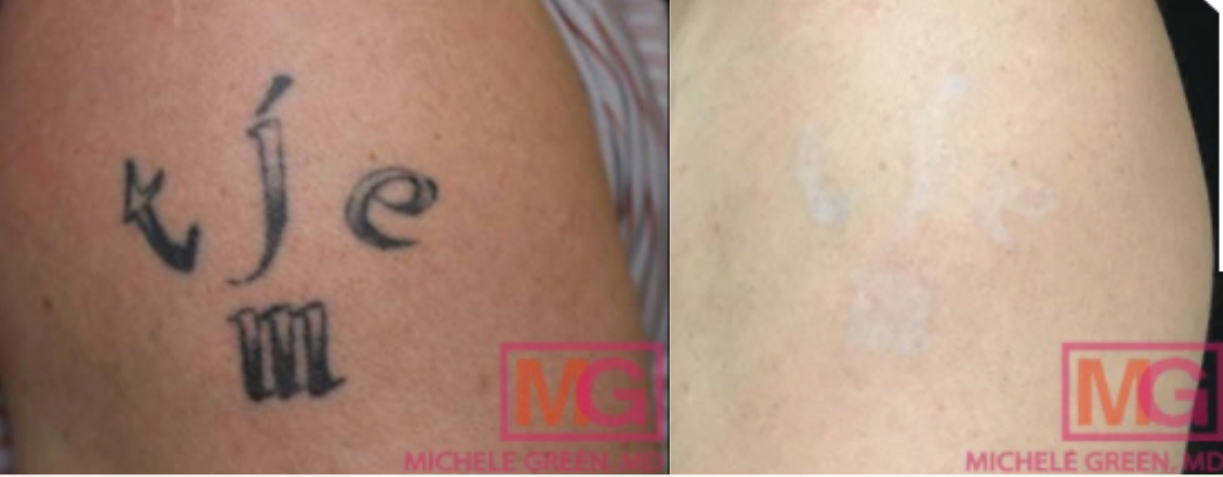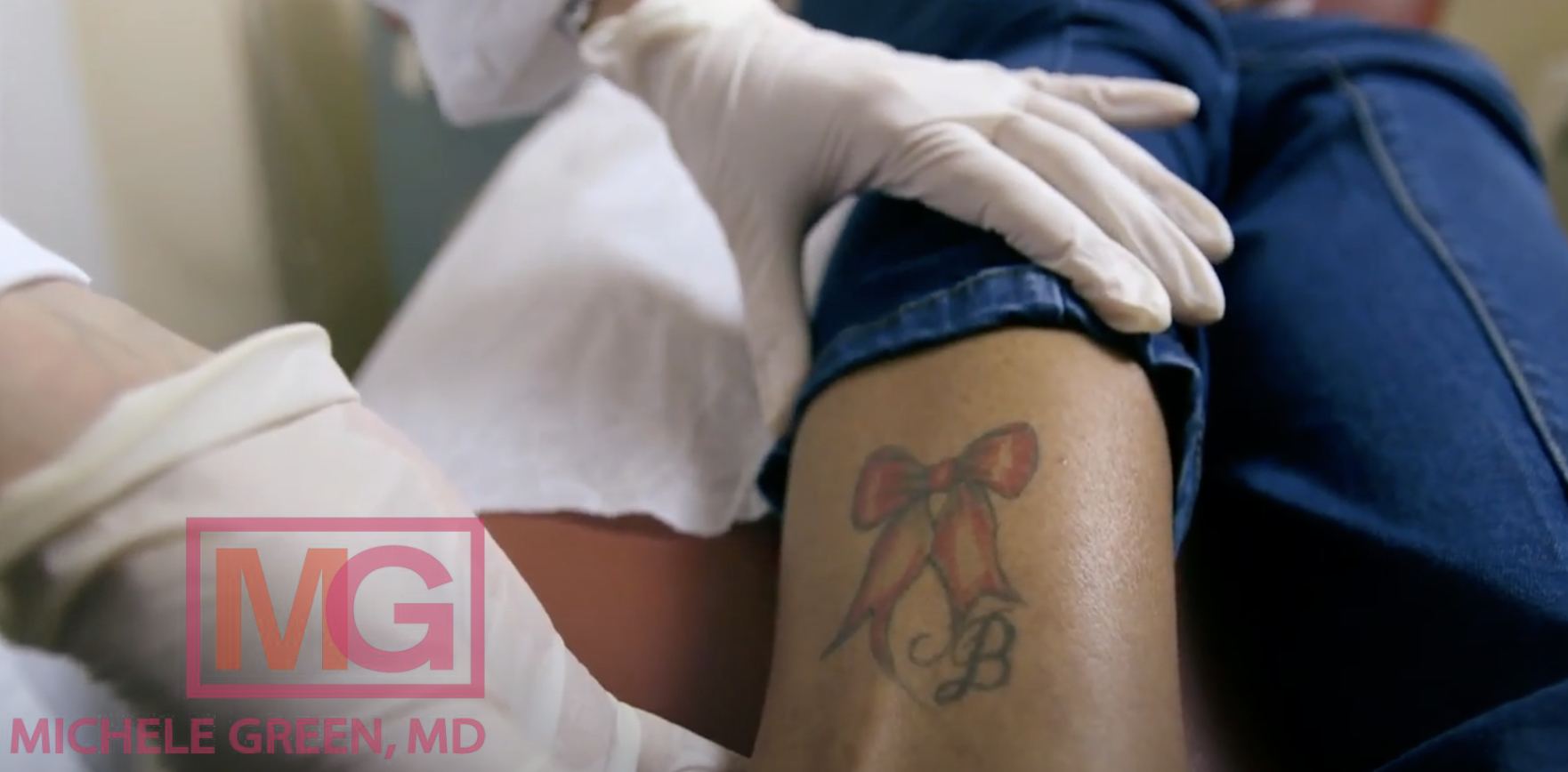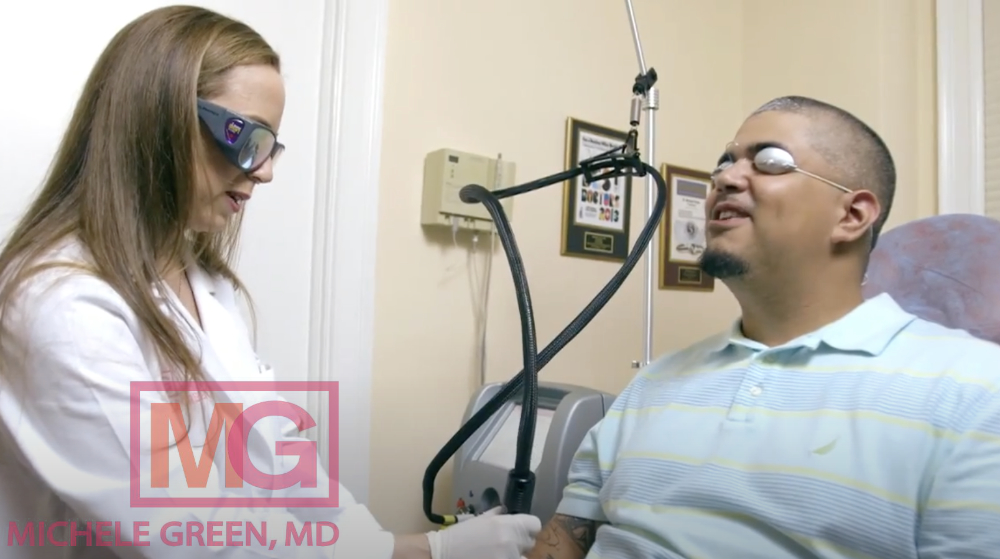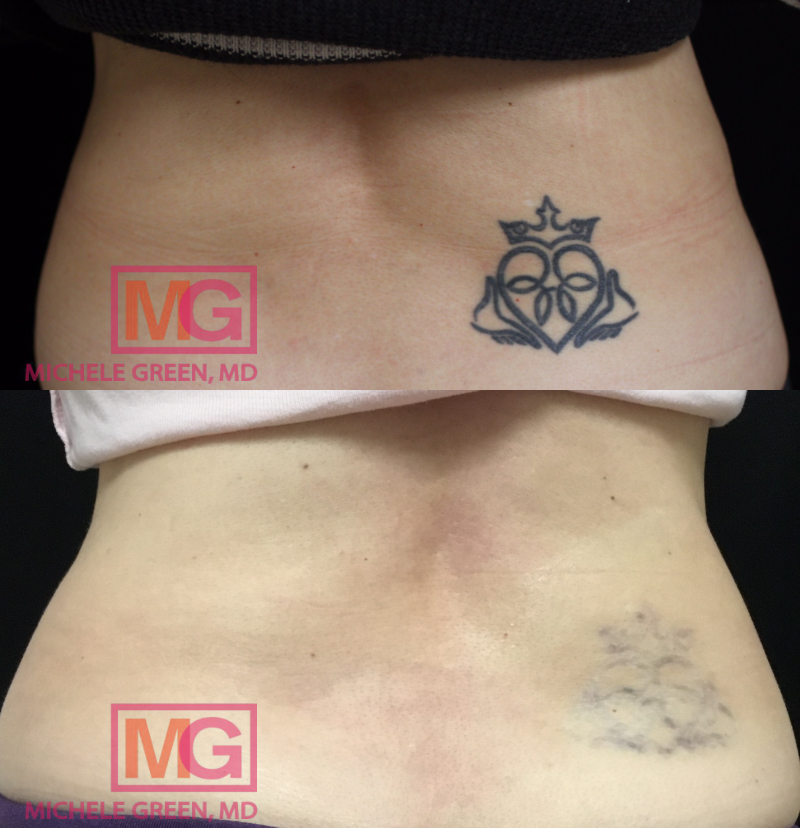Tattoo Regret
Tattoos are becoming increasingly common in the United States, as nearly 30% of all Americans and almost half of all millennials have them. For a lot of people, original tattoos can be a symbol of self-expression, a representation of an important memory or relationship, or just aesthetically pleasing. Others, however, may have second thoughts and regrets after receiving lettering, symbols, or art that will be present on your body for the rest of your life. Some tattooed people may feel immediate regret, which frequently occurs if the decision to get that tattoo was impulsive in the first place, or tattoo regret may set in after a couple of years, which can occur if the tattoo represents a relationship that ended, if the tattoo was acquired in youth (such as high school), or if an inexperienced tattoo artist did the tattoo and the design or product is messy. Tattoo regret causes many patients to wonder, “What do I do if I regret my tattoo?” The best first step in addressing tattoo regret is to schedule a consultation with an expert dermatologist, such as New York City-based Dr. Michele Green, who can talk through your options and help you decide if the tattoo removal process is right for you.
Patients with tattoo regret have several options for addressing their unwanted tattoos. Those who enjoy the aesthetic of tattoos can get a cover-up (or “blastover”) done, which is when a tattoo artist tattoos over the existing tattoo. The cover-up option is popular on TikTok, as artists show how they can turn the patient’s first tattoo into something new and beautiful. The best option for patients who want their tattoo to go away completely is to schedule an appointment with a dermatologist for laser tattoo removal. Before the introduction of laser tattoo removal, the only available tattoo removal methods were dermabrasion, cryosurgery, or surgical excision with plastic surgery. These procedures were painful, with significant downtime and a high risk of scarring or infection. Thankfully, tattoo removal procedures have evolved with modern laser technology and allow for complete tattoo removal that specifically targets the pigment in the tattoo without affecting the surrounding skin. A benefit of the laser tattoo removal procedure is that it is relatively painless, with minimal downtime, and with a low risk of scarring. To get started with laser tattoo removal, contact Dr. Green’s office today.
Dr. Michele Green is a world-class expert in cosmetic dermatology and laser tattoo removal. She has been safely and effectively removing black and colored tattoo ink in patients of all different skin tones with laser treatments for over 25 years in her Upper East Side, New York office. Dr. Green has the most cutting-edge laser treatments to remove unwanted tattoos, regardless of the size and color of your tattoo. During your consultation, Dr. Michele Green will discuss the process of tattoo removal, the number of treatments needed, and the best laser technology for you. Well-known for high patient satisfaction, Dr. Green has been voted one of the best dermatologists in New York City by such publications as Castle Connolly, New York Magazine, and Super Doctors.

Will I regret my tattoo?
Before getting a new tattoo, people wonder, “Will I regret my tattoo when I’m older?” This feeling is called “tattoo regret,” a phenomenon in which a tattooed person regrets one or more of their own tattoos. Whether or not you love your tattoo for your whole life is a deeply personal question, and affection for various tattoos on your body may fluctuate throughout your life. When surveyed, approximately 25% of people with tattoos regret at least one of their tattoos, and tattoo regret is typically associated with getting your first tattoo at a young age, getting a tattoo to be fashionable, or getting a tattoo by an amateur (meaning that the tattoo may not have turned out well). According to tattoo artists, the best way to decrease the likelihood of experiencing tattoo regret is to consider the tattoo for at least six months and research the tattoo artist you are visiting by meeting with them and looking through their portfolio rather than just looking at followers, likes, or upvotes on social media platforms.
How to deal with tattoo regret
Tattoos cost a lot of money and remain present on your body for the rest of your life, so, naturally, some people will regret the decision, particularly if it was made impulsively or in youth. If you are experiencing regret about tattoos, there are several options to deal with the feeling. If you are someone who likes the look of tattoos in general but regrets one specific tattoo, you can go for a cover-up job. Rather than working with a blank canvas or your skin, the tattoo artist will use the first tattoo as a base for a new design, providing you with a new look. If you are looking to remove your tattoo completely, another option is laser tattoo removal. Laser tattoo removal is an excellent option for patients of all skin types with tattoos of all colors (not just black ink). Lasers such as the Alex TriVantage Q-switched laser or the Picosure picosecond laser are safe and effective options for tattoo removal with excellent results.
What to do if you regret your tattoo?
The best first step for patients seriously considering tattoo removal is to consult with an expert board-certified dermatologist, such as Dr. Michele Green. Dr. Green can explain all of the treatment options available for removing a tattoo and recommend the laser treatment option that will be best for the type of ink used in the tattoo and your particular skin type. Laser tattoo removal at Dr. Green’s office is safe for patients of all skin tones.
What is laser tattoo removal?
Laser tattoo removal is the best treatment option for completely and permanently removing tattoos. Dr. Green has several laser removal treatment options available at her New York City dermatology office, including the Picosure laser and the Alex TriVantage Q-switched laser, which is often considered the gold standard. Laser tattoo removal targets pigmentation in the skin with laser energy, which shatters the pigment, allowing the body to metabolize it and causing the tattoo to fade. Laser tattoo removal typically requires multiple treatment sessions, with the exact number of sessions depending on the size and scope of the tattoo. When you have your initial consultation with Dr. Green, her office will provide a closer estimate of the number of treatment sessions necessary and the total cost.

How can I remove a tattoo I regret getting? How does laser tattoo removal work?
Modern laser tattoo removal is the most effective method for removing tattoo pigment without damaging the surrounding skin. When tattoos are created, the ink is placed deep into the dermis, below the outer layer of the skin. Your body’s natural immune system sends white blood cells to the area to filter as many ink particles as possible. Larger ink particles that the white blood cells are unable to break down are left behind, leaving the tattoo design on your skin. Over time, the white blood cells break down the leftover larger particles, leading to the natural fading of the tattoo ink. This means that your immune system is always trying to get rid of the tattoo ink as if it is a foreign body in the skin that does not naturally belong.
Laser tattoo removal plays into the fact that your immune system is actively trying to get rid of the tattoo ink. In laser tattoo removal, the laser system breaks up the pigments in the tattoo ink, layer by layer, with a high-intensity light beam. The pigment breaks down into microparticles, which are then carried out by white blood cells via phagocytosis and eliminated from the body through the liver. Laser tattoo removal works based on the principle of selective photothermolysis. This means that the darker the tattoo ink color, the more wavelength is absorbed by the laser, and the easier the ink gets destroyed. Because black pigment absorbs all laser wavelengths, it is the easiest color to treat. Colored pigments can be treated by specific lasers at different wavelengths based on pigment color. The laser tattoo removal process removes tattoo ink from the skin to reveal the clear, natural skin underneath.
Alex Trivantage Q-Switched laser for tattoo removal
The most popular and safest laser is the Q-switched laser, which is the gold standard in laser tattoo removal. The Q-switched laser is a high-intensity pulsed beam of light that pushes the laser into the skin in short bursts of energy. When the laser is delivered to the skin, the pigment absorbs the energy of the laser, which is then converted to heat. Chemical bonds in the pigment break down, and small pigment particles are removed from the skin through blood vessels and the lymphatic system.
The Candela Alex TriVantage® is a unique Q-switched laser/nd-YAG that is gentle and safe for all skin types, including darker skin and Asian skin. One of the advantages of this laser is that it can remove tattoos with different colors of ink without damaging the surrounding skin. Alex TriVantage removes tattoo ink safely and effectively, with minimal discomfort. Blue and green inks are known for their stubbornness during tattoo removal, but Alex TriVantage can break down even blues and greens. The Alex-TriVantage can be used for tattoo removal on all areas of the body, including the face, neck, arms, legs, and back. The same laser technology is also effective at removing pigmented lesions, brown spots, sun spots, and age spots from the face and body.
Helios 785 laser tattoo removal for dark skin
The Helios 785nm laser is a new, innovative treatment option for tattoo removal. This laser is unique in that it incorporates both pico and nano technologies, employing 532 nanosecond, 785 picosecond, and 1064 nanosecond wavelengths. The breadth of wavelengths allows providers to treat various ink colors, including black, blue, purple, and green ink, and tailor treatment to a patient’s specific skin type. The Helios 785 laser breaks down tattoo ink into tiny particles, which are then absorbed and excreted by the body. Unlike other tattoo removal lasers, the Helios 785 laser has been clinically proven to be safe in sensitive Asian skin and in darker skin, including patients with Fitzpatrick skin types III-IV. Multiple treatment sessions spaced at least four weeks apart are required for optimal tattoo removal, depending on the type of ink and response to treatment. In addition to tattoo removal, the Helios 785 laser is also effective in treating sun spots, freckles, and discoloration for clear, bright skin.
Picosure laser for tattoo removal
The Picosure laser is a picosecond laser that is FDA-approved for tattoo removal. The Picosure’s 532nm, 755nm, and 1064 nm wavelengths can help to remove a wide variety of tattoo inks. The 532nm wavelength effectively removes warm colors such as red, orange, and yellow, and the 755nm wavelength easily removes black, blue, and green ink colors. The 1064nm wavelength delivery is an excellent option for eliminating black ink on patients with darker skin types. Additionally, the boost mode on the Picosure laser safely and effectively treats recalcitrant tattoos through a shortened pulse width. Picosure Laser Treatments can be applied to most areas of the body, including the upper arms, forearms, legs, and buttocks. Patients typically find that unwanted pigment and tattoo ink can be entirely removed in a series of 3-6 treatment sessions, spaced 4 to 8 weeks apart, depending on the tattoo and your skin tone. Once all of the treatments have been performed, the tattoo will be permanently removed.
Frequently Asked Questions on Tattoo Regret:
How common is tattoo regret?
Patients considering getting a tattoo often ask, “How many people (what percent) regret getting a tattoo)?” According to a literature review published in the Indian Journal of Dermatology and reports by Advanced Dermatology, approximately one in four people who have tattoos regret at least one or more of them. There are many reasons why one might regret a tattoo, but one of the most common reasons is impulsive decision-making. According to the Advanced Dermatology report, 75% of the people who feel tattoo regret did not plan for their tattoo for more than a month, meaning they made a spontaneous decision to get their tattoo in the first place. While tattoo regret is not uncommon among people with tattoos, the majority of those who are dissatisfied with their tattoos do not do anything about it. Of the 302 tattooed people surveyed by researchers published in the Indian Journal of Dermatology, only about 11% of those who regretted their tattoos took action to cover up or remove the tattoos.
Is tattoo regret normal?
Patients sometimes wonder, “Is it normal to regret a new tattoo?” Tattoo regret is fairly common among tattooed people, with approximately 25% of people surveyed reporting that they regret at least one of their tattoos. According to a study conducted by Advanced Dermatology, the age at which you acquire your tattoo is a major factor in predicting whether or not you will grow to regret it. 46% of people surveyed reported that they got the tattoo they most regretted when they were under the age of 20. The amount of planning time involved in the tattoo can also predict whether patients will feel regret later, with approximately 75% of people who regret their tattoos having spent less than a few weeks considering getting it. If you are considering getting a tattoo, one of the best ways to minimize the risk of tattoo regret is to spend a couple of months thinking about it before going to an artist.
What is the most regretted tattoo?
Tattoo regret can arise for several reasons, including emotional associations with the work, the quality of the art, and a changing sense of aesthetics. Some of the most frequently regretted tattoos are those with the name of a specific person, English lettering of phrases that remind you of a specific relationship, or other forms of “my personal information.” If the nature of the relationship changes, these tattoos can become associated with heartbreak or moments of struggling mental health. Some people regret the tattoos they got when they were young, as they no longer reflect their current aesthetic or sense of self. Others regret tattoos that were given by an amateur or were not well taken care of, and over time, may continue to look worse and worse.
Donald Trump and Kamala Harris presidential election tattoo regret
During times of heightened emotions, such as a presidential election, many people turn to tattoos to show support for their candidate. Tattoos can serve as a visible display of dedication and endorsement for the policies and morals that a candidate stands for. Recently, there has been an increase in Trump or Harris tattoos, with many being prominently displayed on arms, legs, and wrists. While most individuals are perfectly content with their tattoos, some can feel regretful about them, especially when the election is over, or their support for a candidate declines over the years. If you have a presidential election tattoo that you regret, consult with a board-certified dermatologist like Dr. Green to talk about laser tattoo removal.
Why you shouldn’t regret tattoos
Several steps can be taken before getting a tattoo to minimize the risk of tattoo regret immediately or in later years. To avoid receiving a tattoo that looks unprofessional or messy, be sure to research your tattoo artist. You can schedule a consultation with them to discuss your aesthetic goals and take a look at their portfolio and flash to be sure their style suits yours. It is also important to spend time thinking over whether or not you really want a tattoo rather than getting one impulsively. If you come up with an idea and still want it after several months, the chances are that you will not regret it. When it does come time for your appointment, be firm about your desires and speak up if the design is not exactly what you want. Do not sell yourself short or let yourself get pulled into something you are not sure about. Some tattooed people and artists also advise that you acknowledge that your aesthetic style and relationship to your memories will shift and change as you grow up and let the tattoos on your body remind you of how you got to where you are today.
Does tattoo regret go away?
Since tattoos are permanent art fixtures on your body, it is common for patients to feel some anxiety or regret after getting a tattoo, especially after their first tattoo. Tattoos change the way your body looks, and they can take some time to get used to. Many people find that given time, they can settle into how they look with a tattoo. You can help to keep your tattoo looking good for the years to come by taking good care of it while it heals and always wearing sunscreen when you go outside. Tattoos can fade due to sun exposure, so protecting your ink from the sun is essential to keep it looking good in the years to come. If your tattoo regret does not fade over time, options are available for removing the pigmentation from your skin, including laser tattoo removal with expert dermatologist Dr. Michele Green.

How to get started with tattoo removal today
Tattoo regret affects one in four tattooed people, and laser tattoo removal treatment is a safe and effective way to eliminate an unwanted tattoo with minimal discomfort and downtime. The treatment uses laser technology to break down the pigmentation in the deep layers of the skin so that your immune system can metabolize the pigment and reduce the appearance of the tattoo. By triggering the body’s metabolic processes, laser tattoo removal is much less invasive than older methods of tattoo removal but no less effective. For the best results, patients will need a series of treatment sessions in order to remove the tattoo fully. Patients will consult with expert dermatologist Dr. Green to create the best treatment plan to suit their aesthetic goals.
Dr. Michele Green is an internationally renowned board-certified dermatologist with over two and a half decades of experience providing her patients with the best non-invasive treatment options. Dr. Green takes a holistic approach and embraces a less-is-more philosophy, creating customized skincare routines and treatment plans that cater to the unique concerns and aesthetic goals of her patients. She is consistently identified as one of New York’s best dermatologists by Castle Connolly, New York Magazine, and Super Doctors for her dedication to her patients and expertise. Please call us at 212-535-3088 or email our New York City-based office today to schedule a consultation with Dr. Michele Green and find out if laser tattoo removal is the best option for you.
 212-535-3088
212-535-3088 